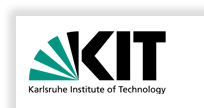The main objective of our education is to impart building science as an integrated part of the architectural design. The focus with regard to teaching is put on phenomenological ways in disseminating basic knowledge. Furthermore an essential concern is the integration of building science related questions into the planning process. Therefore, the students are asked to conduct interdisciplinary exercises in cooperation with other technical chairs and other disciplines within the faculty. The choice of calculations procedures is oriented at their application in the planning practice as well. By the application of predominantly computer based planning and simulation tools the students will be enabled to assess and to optimize their design solutions with regard to the optimization of indoor climatic and visual conditions, as well as e energy-related requirements by themselves.
The `Artificial Sky` at the Building Science Group (fbta) represents an unusual feature in this context, which was realized with support of the Hochschulgemeinschaft für Lichttechnik (HfL) and Fa. Osram. It facilitates light technical examinations of architectural models in different scales with respect to lighting conditions and shading effects.
Main emphases of education in the higher semesters are closely connected to our research projects In such a way, we are able to offer interested students the possibility of scientific working. Primary topics are thereby integral energy concepts for climate-neutral buildings, comfortable indoor climate conditions and the design of led (day-)light concepts.
The students should gain the following skills:
- understanding of the fundamental principles of building science and technical building services which are relevant to architects
- ability to use and apply basic predictive calculation methods and design tools – e.g. heating energy balance of a building, Glaser-method for estimating condensation in constructions
- ability to integrate building science aspects into the design process and evaluate them in the context of of the whole design project
- advanced understanding of special topics of building science focussing on energy efficient buildings, indoor climate and lighting design
- ability to use and apply advanced predictive calculation methods and design tools – thermal building simulation, simulation of lighting conditions
- ability to implement building science aspects into the design process and evaluate them in the context of the whole design project
- capability of pursuing scientific work as student research project or thesis in the context of fbta research projects. This is also open to students of other departments.

